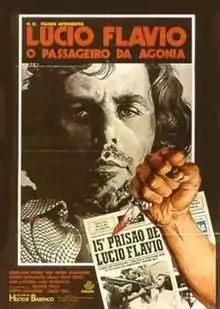Lucio Flavio (film)
Lucio Flavio[1] (Portuguese: Lúcio Flávio, o Passageiro da Agonia) is a 1977 Brazilian film directed by Héctor Babenco based on the book of the same name by José Louzeiro, who co-wrote the screenplay. It stars Reginaldo Faria as Lúcio Flávio, a famous bandit in Rio de Janeiro in the 1970s.[2] Babenco did not want to limit the story to Lúcio Flávio, and stated it was also a film about Esquadrão da Morte, a death squad from the 1960s.[3]
| Lucio Flavio | |
|---|---|
 Theatrical release poster | |
| Directed by | Héctor Babenco |
| Produced by |
|
| Written by |
|
| Starring | Reginaldo Faria |
| Music by | John Neschling |
| Cinematography | Lauro Escorel |
| Edited by | Sílvio Renoldi |
Production company | H. B. Filmes |
| Distributed by | Embrafilme |
Release date |
|
Running time | 125 minutes |
| Country | Brazil |
| Language | Portuguese |
Cast
- Reginaldo Faria as Lúcio Flávio
- Ana Maria Magalhães as Janice
- Grande Otelo as Dondinho
- Ivan Cândido as Bechara
- Lady Francisco as Lígia
- Milton Gonçalves as 132
- Paulo César Peréio as Dr. Moretti
- Stepan Nercessian
- José Dumont
Release and reception
It premiered on November 22, 1977 at the 1st São Paulo International Film Festival,[4] where it was elected the Best Film by the audience.[2][3] In February 1978, it won the Best Actor (Faria), Best Supporting Actor (Cândido), Best Cinematography and Best Editing awards at the Gramado Film Festival.[5] The film also entered the Taormina Film Fest,[6] where it won the Best Actor Award.[4] It debuted on the commercial circuit with 100 copies, breaking King Kong's 81, on February 27, 1978.[3][4] As of November 2014, Lucio Flavio was the sixth most-watched Brazilian film with an audience of 5,401,325.[7]
References
- Yakir, Dan (February 26, 1984). "American Stars Team Up on a Brazilian Movie". The New York Times. Retrieved December 5, 2014.
- ""Lúcio Flávio" estreará em cem cinemas". O Estado de S. Paulo (in Portuguese). February 17, 1978. p. 14. Retrieved December 5, 2014.
- ""Lúcio Flávio", trajetória de sucesso". Folha de S. Paulo (in Portuguese). February 27, 1978. p. 19. Retrieved December 5, 2014.
- "Lúcio Flávio o Passageiro da Agonia" (in Portuguese). Cinemateca Brasileira. Archived from the original on March 4, 2016. Retrieved December 5, 2014.
- ""Doramundo" vence o Festival de Gramado". Folha de S. Paulo (in Portuguese). February 27, 1978. p. 17. Retrieved December 5, 2014.
- "Comienza el Festival de Cine de Taormina". El País (in Spanish). July 19, 1978. Retrieved December 5, 2014.
- Hermsdorff, Renato (November 28, 2014). "Os 20 filmes brasileiros mais vistos da história" (in Portuguese). AdoroCinema. Retrieved December 5, 2014.
External links
- Lucio Flavio at IMDb